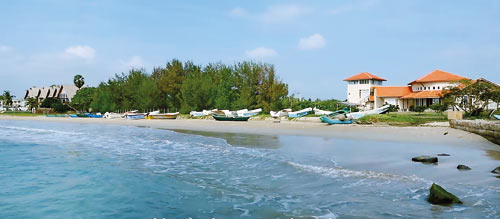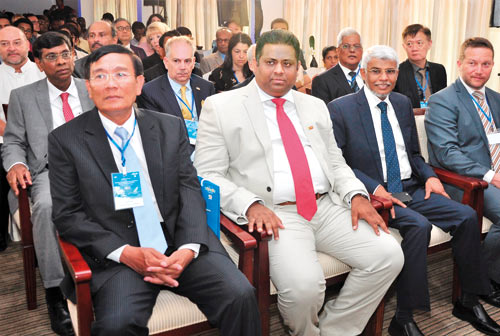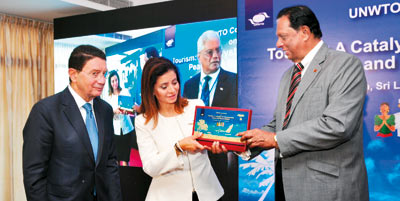UN body aims to return to conflict zones to measure peace thro’tourism

Fishing boats at Passikudah
PASSIKUDAH, Batticaloa: Sri Lanka? Wasn’t there a war there?
This was a question that confronted Trevor Claringbold, British-based Editor of Pro-Traveller magazine and Creative Director of Globetrotter Television channel, when he told friends and colleagues he was travelling to Sri Lanka. ”More than one person asked me … Ah! Sri Lanka was that country at war? The point I’m making is that people still believe Sri Lanka is at war and that may be due to the lack of promotion,” he told a panel discussion in this hot and dusty eastern town this week. Passikudah, a fast-developing Eastern paradise for tourists with an expansive beach, was hosting a UN World Tourism Organisation (UNWTO) conference on “Tourism as a catalyst for Development, Peace and Reconciliation”.
Marked to coincide with Sri Lanka’s golden jubilee in tourism, the 2-day event combined with a familiarization tour for foreign delegates including foreign media to Kandy, Trincomalee and Jaffna, saw top industry officials including UNTWO Secretary General Taleb Rifai making their presence and sharing thoughts on growing tourism in a post-conflict scenario. Mr. Claringbold’s comments during a discussion on “marketing and rebranding of post-conflict destinations” was echoing what the local tourism industry has been saying all along.
While Sri Lankan authorities have relied on a combination of word of mouth, repeat visitors and curious travellers (keen to see what the country post-war looks like), there has been no focused country promotion to tell the world that Sri Lanka is at peace and ready for tourism which had struggled through nearly 30 years of war. Many industry veterans have lamented the absence of a promotion campaign while one that is being planned (since mid-2015) is ‘trapped’ in a web of committees and officialdom. A senior official at the event told the Business Times that the process of approving a promotion campaign may take longer than anticipated and likely to be ready only by late this year or early next year. By that time, an industry veteran remarked cynically, “we would have missed the bus once again”!

Dignitaries
“Show pictures of smiling people, families”
The British journalist’s message was simple: “Get people, families smiling (on tourism literature). You need some nice pictures of a family playing, relaxing, smiling – essentially showing the country is safe to visit. Pictures of families create that atmosphere.” His view is nothing new and known all along but coming from a foreigner gives it more clout even though local industry personalities have flagged these issues, many a time. As in every international conference, the hosts – Sri Lanka – were warmly applauded for the hospitality and welcome at this beach destination where other than hotels, there were few villagers around except for the fishing community.
The accolades and warm handshakes were enhanced by ‘Big John”, the affable name by the local media to Tourism Minister John Amaratunga, due to his towering personality, having a go at singing and dancing at a gala dinner much to the delight of the foreign delegates. UNTWO Dr. Rifai also joined in the fun. On a more serious note, the conference opened on Tuesday at the Amaya Beach Resort, with the Minister saying the conference was timely to transform this former war-ravaged region as tourism is not only a catalyst for reconciliation in the North and the East but that no other industry that can bring people together, so quickly and heal communities.
UNWTO Secretary General Rifai said they gladly accepted Sri Lanka’s suggestion to hold this conference in this eastern town and provide a means of hope to people who have suffered during the conflict. “Passikudah, to me, is heaven on earth and Sri Lanka is now a peaceful, unified and welcoming nation. When I grew up it (in Jordan) the names that I have heard were Tito (legendary Yugoslav leader Josip Broz Tito), Nasser (Eqyptian leader Gamal Abdel) and Bandaranaike (former Sri Lankan Prime Minister Sirima),” the 67 year-old Mr. Rifai said. Noting that the world is suffering from inequality, he pointed out that travel can be a great bridge (of this divide) – people meeting each other, eating, chatting with minds and hearts open.
Tourism transforms communities
Tourism has transformed many countries that suffered from conflict. Take Croatia for example, he said adding that this country now attracts 12 million visitors while millions are going to Cambodia, a country once known as the killing fields. He added: “I was delighted to hear the welcoming sounds of fire crackers (in Passikudah). Some years ago these sounds would have been different (and of a more intimidating nature).”
During the panel discussion on tourism as a force for peace and reconciliation, Martin Brackenbury, former president of the International Federation of Tour Operators (IFTO), spoke on the need to establish a sound framework, ethical guidelines and bringing in communities involved in agriculture and fishing into the tourism discussion and development. He said transforming, for example a fisherman to becoming a hotelier, needs proper education, guidelines and proper policies. Chantha Tith, Cambodia’s Deputy Tourism, provided some lessons for Sri Lanka, with his country also recovering from a bloody conflict.
Killing fields-scarred Cambodia attracts 4 million visitors
Acknowledging that tourism played a significant role in post-conflict development, Mr. Tith explained that post-war Cambodia first invited all Cambodians, who fled the war and had become permanent residents abroad, to visit the country. “We welcomed them home, did away with visas (as they had foreign passports). This was the first step towards tourism – inviting our own people back,” he said, adding that former fighters were reformed to work as tour guides. Cambodia recorded 4.7 million tourist arrivals last year with Mr. Tith saying however the country is faced with many challenges.
In the happy and warm atmosphere at the meeting, many promises were made and assurances given. One such offer came from Ivan Ujhelyi, a Hungarian member of the European Parliament and Vice Chair of the Committee on Transport and Tourism. So enamoured with Sri Lanka, the people and the hospitality, he offered to serve as a kind of ambassador for Sri Lanka in the European parliament to promote tourism. There was a lot of hand-clapping and cheering. However it remains to be seen on how quickly tourism authorities get him on board, before the offer wears out.
A similar but more (one would say) effective offer came from Liu Yi, Deputy Head of Tourism Management and Planning in School of Tourism Management, Sun Yat-sen University in Guangdong, China.
Having completed a study on Chinese tourists to Australia where the research involved assessing the views of these tourists, their likes and dislikes, Dr. Liu offered to do a similar study of Chinese visitors to Sri Lanka and comparing their needs to that of western tourists.Batticaloa District Secretary P.S.M. Charles explained in detail the economic and social background of the district which also includes Passikudah. She said there were many challenges, the foremost being that most of the people are living below the poverty line. In terms of tourism, the challenges are the lack of local human capital, the lack of understanding tourism and its benefits but hopefully a new 5 year tourism development plan will transform the district for the benefit of its inhabitants, she said.

Tourism Minister John Amaratunga, Jordanian Princess Dana Firas (who made the keynote address) and UNWTO Secretary General Taleb Rifai
Family values in community engagement
One of the highpoints of the conference was the thoughts expressed by two Sri Lankan families involved in tourism with distinctive brands – Jetwing and Dilmah. Their message was quite clear: Don’t hurt local communities. Local communities should not only be part of the development but also the decision-making process as equal partners. Hiran Cooray, Chairman of Jetwings Hotels, explained how his father taught him not to upset local communities, seemingly like following the well-known phrase “when in Rome, do as the Romans do”. He said: “When we first started a small hotel in Negombo (many decades back), he used to tell me not to hurt the fishermen; don’t drive too fast (as I was learning to drive); don’t toot the horn. He was essentially telling us to respect local communities and this was long before linkages between tourism and community development were spoken on.”
He said what is exciting now is that 40 per cent of the tourists are not staying at hotels but in homes and small tourist accommodations. This is helping the informal sector and helping these small units to flourish and in the process help local communities. Stressing the need for more local community engagement in tourism, he referred to their own experience in Jaffna where the Jetwing group has only a 25 per cent stake in the newly-opened Jetwing hotel there with the balance coming from the public and the Tamil diaspora. “Eventually the people there should own and manage this property,” he said. Speaking at another panel discussion, but reflecting similar thoughts was Dilmah’s Operations Director – Malik Fernando, whose father founded the famous Dilmah tea brand.
The younger Mr. Fernando, who handles the company’s leisure brand the best-known being Ceylon Tea Trails, said their focus was to preserve Sri Lanka’s cultural heritage (British-built tea bungalows). He said local hoteliers need to be supported for while international brands are welcome, its mostly local hotels that are sustainable and have more links with the community. Anita Mendiratta, Special Advisor to the UNWTO Secretary-General and international consultant, had an interesting perspective: Why should people care for tourism if they are not part of the development process?
Community experiences matter, not fast food and McDonalds
Explaining that in detail, she said tourists are not asking for or looking for Starbucks or McDonald’s in countries they visit. “These are what we want,” Ms. Mendiratta who lives in South Africa, said. “Tourists want to experience what people can offer, the culture, traditions”. Vinya Ariyaratne, General Secretary of the Sarvoday Movement, spoke on the many ways the organization has engaged the communities it has worked in, through tourism, one area being ‘voluntourism’, a combination of volunteerism and tourism. Sarvodaya has an average 1,500 to 2,000 foreign volunteers who spend weeks offering their services to the community.
While urging that tourism development should not harm the environment and be mindful of social and cultural sensitivities, he stressed one point: “We are a post-war society, not a post-conflict society”. By this he meant that while the war is over, the issues that fomented the conflict, remain. Eastern Province Chief Minister Ahamed Nazeer dealt at length about the post-conflict development, explaining that among the plans are to increase the number of rooms to 7,000 in the next five years from 1,300 currently. In the East, he said, “we want to create our own Gold coast (destination).” He was referring to Australia’s famed Gold Coast on Australia’s east coast, famed for its long sandy beaches and surfing.
In his closing remarks, the UNTWO chief said that based on a suggestion by the Tourism Minister, the UN agency plans to hold a similar conference in Sri Lanka every year. At the event, five companies represented by Ms. Stasshani Jayawardena (Director at Aitken Spence Hotels), Neelantha Rupasinghe (Group GM, Lanka hotels and Travels Pvt Ltd), Ranika Wickramanayake (GM, Laugfs Leisure Ltd), Ooshan Edirisinghe (Senior Marketing Manager, Siddhalepa Resorts) and Chandra Wickremasinghe (Chairman of Theme Resorts & Spas), enrolled in UNWTO’s Code of Ethics. By doing so, Sri Lanka became the 65st country in the world where companies have opted to endorse this Code.
| Quick takes | |
|


